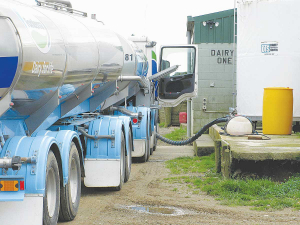Another Windfall for Fonterra Farmers, Unit Holders
Fonterra farmer shareholders and unit holders are in line for another payment in April.
 The last time the milk price was this high, many farmers fed cows more feed, produced more milk but made no more money.
The last time the milk price was this high, many farmers fed cows more feed, produced more milk but made no more money.
Fonterra recently announced a forecast milk price range for the coming season of $7.25 to $8.75 per kgMS, with a midpoint of $8.00 per kgMS.
This makes the prospect of producing a lot of milk very tempting. In many cases, taking advantage of one of the few times when milk price reaches this kind of height simply makes sense.
Those of us who have been around for a while can remember the last time that the milk price went high. While some farmers were able to capitialise on the high milk price by producing more milk economically, many farmers fed more feed, produced more milk, but made no extra money. What was the difference between those who made money and those who didn’t? There were three main things that the more profitable farmers did that the others failed to do. They:
Kept feed costs under control.
There is a huge temptation to spend more money when you have more money. We tend to think that more is best. The farmers who made a lot of money during the last high payout were the ones who didn’t give into temptation of feeding a lot of high-cost feed (e.g. expensive meals or high cost protein feeds). They stuck to feeding low priced energy feeds like maize silage and PKE (which was a lot cheaper at the time than it is now). Cows can produce their body weight in milk solids in systems that feed pasture, maize silage and PKE, and farmers can keep their feed costs under control.
Many farmers grew more maize silage on farm or a run-off. Farmers buying in feed kept costs under control by planning and contracting feed requirements early. They made sure they were not exposed to high spot prices that inevitably come when milk price rises. Farmers buying in maize silage placed early contracts with contract growers to ensure they had the feed they needed at a price which was agreeable to both parties.
Didn’t give into temptation with other costs.
Farmers who made high profits during the high payout tended to keep other costs under control. Animal health costs often soar when the payout is high. This is because the people who sell these inputs can be even more aggressive during high payout years, promising that product X, Y or Z will give cows the lift they need to produce extra milk. While these products may work and production increases, they still may not be economic to feed. Likewise, more of a good thing doesn’t necessarily mean more profit. This is especially true for minerals. A recent AgFirst Waikato newsletter says, “We have seen many situations where the in-shed feeding mix is formulated to meet cow mineral requirements, but the farmer is adding additional minerals in some other form (e.g. through the feed-out wagon or pasture dusting). This adds cost and, in a few cases, can increase the risk of animal health issues.”
Didn’t forget grass
Some farmers feeding supplements take their eyes off good pasture management. Good pasture managers tend to make more profit by making sure that:
Maize silage is still one the best feeds to have on hand in high payout years simply because if you need it, it is there to be used. Likewise, if for whatever reason you don’t need it, it can stay in the stack for when you do need it.
Ian Williams is a Pioneer forage specialist. Contact him at This email address is being protected from spambots. You need JavaScript enabled to view it.
Global trade has been thrown into another bout of uncertainty following the overnight ruling by US Supreme Court, striking down President Donald Trump's decision to impose additional tariffs on trading partners.
Controls on the movement of fruit and vegetables in the Auckland suburb of Mt Roskill have been lifted.
Fonterra farmer shareholders and unit holders are in line for another payment in April.
Farmers are being encouraged to take a closer look at the refrigerants running inside their on-farm systems, as international and domestic pressure continues to build on high global warming potential (GWP) 400-series refrigerants.
As expected, Fonterra has lifted its 2025-26 forecast farmgate milk price mid-point to $9.50/kgMS.
Bovonic says a return on investment study has found its automated mastitis detection technology, QuadSense, is delivering financial, labour, and animal-health benefits on New Zealand dairy farms worth an estimated $29,547 per season.
OPINION: Staying with politics, with less than nine months to go before the general elections, there’s confusion in the Labour…
OPINION: Winston Peters' tirade against the free trade deal stitched with India may not be all political posturing by the…